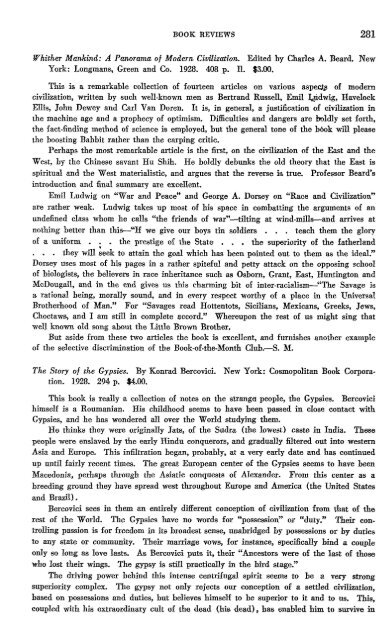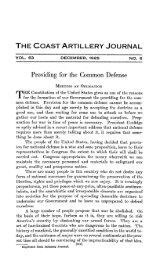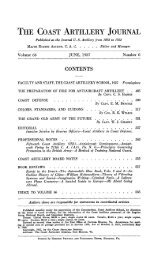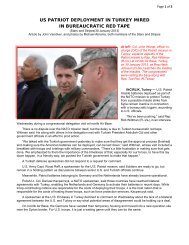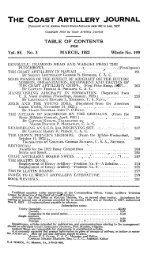THE COAST ARTILLERY JOURNAL - Air Defense Artillery
THE COAST ARTILLERY JOURNAL - Air Defense Artillery
THE COAST ARTILLERY JOURNAL - Air Defense Artillery
You also want an ePaper? Increase the reach of your titles
YUMPU automatically turns print PDFs into web optimized ePapers that Google loves.
BOOK REVIEWS 281<br />
Whither Mankind: A Panorama of Modern Civilization. Edited by Charles A. Beard. New<br />
York: Longmans, Green and Co. 1928. 408 p. n. $3.00.<br />
This is a remarkable collection of fourteen articles on various aspec.t.llof modern<br />
civilization, written by such well-knownmen as Bertrand Russell, Emil L.1idwig,Havelock<br />
Ellis, John Dewey and Carl Van Doren. It is, in general, a justification of civilization in<br />
the machine age and a prophecy of optimism. Difficultiesand dangers are boldly set forth,<br />
the fact-finding method of science is employed,but the general tone of the book will please<br />
the boosting Babbit rather than the carping critic.<br />
Perhaps the most remarkable article is the first, on the civilizationof the East and the<br />
West, by the Chinese savant Hu Shih. He boldly debunks the old theory that the East is<br />
spiritual and the West materialistic, and argues that the reverse is. true. Professor Beard's<br />
introduction and final summary are excellent.<br />
Emil Ludwig on "War and Peace" and George A. Dorsey on "Race and Civilization"<br />
are rather weak. Ludwig takes up most of his space in combatting the arguments of an<br />
undefined class whom he calls "the friends of war"-tilting at wind-mills-and arrives at<br />
nothing better than thi&--"If we give our boys tin soldiers ... teach them the glory<br />
of a uniform ... the prestige of the State ..• the superiority of the fatherland<br />
... they will ~eek to attain the goal which has been pointed out to them as the ideal."<br />
Dorsey uses most of his pages in a rather spiteful and petty attack on the opposing school<br />
of biologists, the helievers in race inheritance such as Osborn, Grant, East, Huntington and<br />
McDougall, and in the end gives us this charming bit of inter-racialism-"The Savage is<br />
a. rational being, morally sound, and in every respect worthy of a place in the Universal<br />
Brotherhood of Man." For "Savages read Hottentots, Sicilians, Mexicans, Greeks, Jews,<br />
Choctaws,and I am still in complete llccord." Whereupon the rest of us might sing that<br />
well known old song about the Little Brown Brother.<br />
But aside from these two articles the book is excellent, and furnishes another example<br />
of the selective discrimination of the Book-of-the-MonthClub.-S. M.<br />
The Story of the Gypsies. By Konrad Bercovici. New York: CosmopolitanBook Corporation.<br />
1928. 294 p. $4.00.<br />
This book is really a collection of notes on the strange people, the Gypsies. Bercovici<br />
himself is a Roumanian. His childhood seems to have been passed in close contact with<br />
Gypsies, and he has wondered allover the World studying them.<br />
He thinks they were originally Jats, of the Sudra. (the lowest) caste in India. These<br />
people were enslavedhy the early Hindu conquerors, and gradually filtered out into western<br />
Asia and Europe. This infiltration hegan, probably, at a very early date and has continued<br />
up until fairly recent times. The great European center of the Gypsies seems to have been<br />
Macedonia, perhaps through the Asiatic conquests of Alexander. From this center as a<br />
breeding ground they have spread west throughout Europe and America (the United States<br />
and Brazil).<br />
Bercovici sees ill them an entirely different conception of civilization from that of the<br />
rest of the World. The Gypsies have no words for "possession" or "duty." Their controlling<br />
passion is for freedom in its broadest sense, unabridged by possessionsor by duties<br />
to any state or community. Their marriage vows, for instance, specifically bind a couple<br />
only so long as love lasts. As Bercovici puts it, their "Ancestors were of the last of those<br />
who lost their wings. The gypsy is stilI practically in the bird stage."<br />
The driving power behind this intense centrifugal spirit seems to he a very strong<br />
superiority complex. The gypsy not only rejects our conception of a settled civilization,<br />
based on possessions and duties, but believes himself to be superior to it and to us. This,<br />
coupled with bis extraordinary cult of the dead (his dead), has enabled him to survive in


